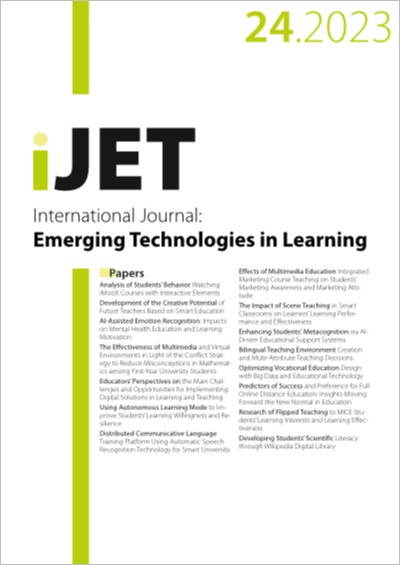Educators’ Perspectives on the Main Challenges and Opportunities for Implementing Digital Solutions in Learning and Teaching
DOI:
https://doi.org/10.3991/ijet.v18i24.44745Keywords:
challenges of implementing digital solutions, digitalization in education, opportunities of implementing digital solutions, technology-enhanced learningAbstract
The gap between technological progress and education is one of the international issues that needs to be addressed. Further education of educators is considered one of the best solutions [1]. Nevertheless, schools struggle with the requirements set by national and international authorities, lacking guidance and support [2, 3, 4]. This research aims to identify the primary challenges and opportunities for implementing the use of digital solutions in learning and teaching. The research questions are as follows: (1) What are the primary challenges for educators when implementing digital solutions in learning and teaching? and (2) What are the key opportunities for educators when implementing digital solutions in learning and teaching? This study examines the reflections and evaluations of educators’ learning experiences in a two-year national-level further education programme aimed at enhancing and advancing their pedagogical digital competence. Throughout the course, educators regularly filled out surveys reflecting on the quality of collaboration in their support groups, their progress towards their professional development goals, their main challenges, and their greatest successes in learning and implementing digital solutions in practice. The study analysed 8,636 responses from educators using a mixed-methods design. Quantitative data analysis was used for the Likert scale questions, while deductive and inductive qualitative analysis was used for the open-ended questions. The results show that many of the factors’ educators mentioned as successes in their learning experience were also mentioned as significant challenges, such as learning to use new digital solutions, applying digital solutions in their work, collaborating with colleagues to learn and implement new digital solutions, and effectively managing time to achieve set goals. Educators need dedicated time to experiment with digital solutions, engage in practical and peer-oriented learning approaches, develop a shared vision, foster collaboration, and receive support to enhance their competence and confidence in utilising digital solutions.
Downloads
Published
How to Cite
Issue
Section
License
Copyright (c) 2023 Edite Sarva, Katrina Elizabete Purina-Bieza

This work is licensed under a Creative Commons Attribution 4.0 International License.



